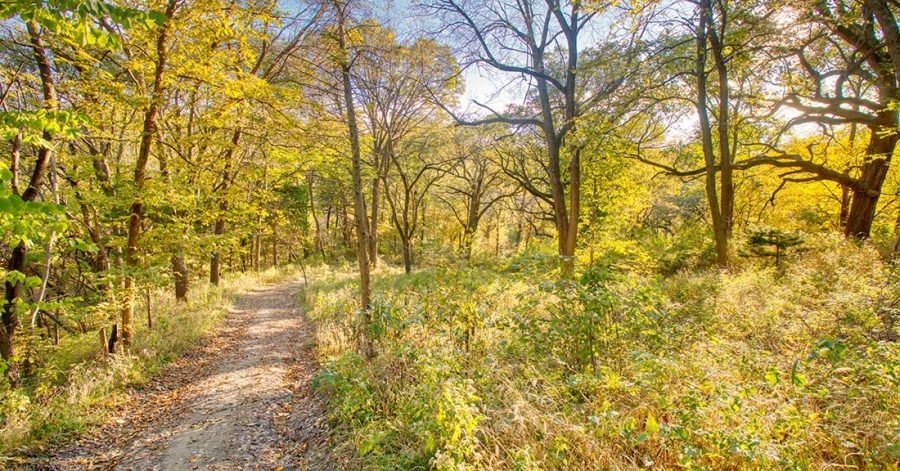I heard on the radio the other day that lately a lot of people are using Google and Yahoo to ask the question, “Is there meaning to life?” or “What is the meaning to life?”
A trail my family and I took on a fall hike in Fontenelle Forest, Nebraska.
I think Christians sometimes even find themselves asking those kinds of questions. But all a believer needs to do is to dig into God’s Word. The words of the Bible provide an answer to the question, “Is there meaning to life?” As the apostle Peter said to Jesus, “Lord, to whom shall we go? You have words of eternal life. (John 6:68).”
And James 1:12 says, “Blessed is a man who perseveres under trial; for once he has been approved, he will receive the crown of life which the Lord has promised to those who love Him.”
Nature and Meaning to Life
What about nature? Can nature answer that question for us? The Bible tells us that nature is another revelation of God. Psalm 19 and Romans 1 tell us that nature’s voice goes around the world declaring the glory of God and His attributes. Everyone hears and sees nature’s declaration about God.
The biblical character Job declared to his friends, “But now ask the beasts, and let them teach you; and the birds of the heavens, and let them tell you. Or speak to the earth, and let it teach you; and let the fish of the sea declare to you. Who among all these does not know that the hand of the LORD has done this, whose hand is the life of every living thing and the breath of all mankind (Job 12-7-10)?”
If nature proclaims the living God then it would make sense that it also proclaims that there is meaning to life. But how can we find meaning in nature?
A Walk in the Woods
Leaves on the forest floor near a trail in Fontenelle Forest.
A walk in the woods can reveal many things about God. My wife and kids and I love to go hiking. During a particular fall hike, we watched the leaves slowly drift to the ground in a gentle breeze. Many of those leaves covered the trail and the forest floor. I talked with my kids about the leaves and wondered with them if the purpose of a fallen leave was done? The answer to that question is “no.”
A leaf that falls to the ground still has purpose. The leaf and many others that pile on the ground may give something a warm place to hide from the cold winter. And in the following year, all the leaves will break down and become part of the soil, giving life to new plants.
So much in nature has a greater meaning than what we see in our first observation. Why do oak trees produce so many acorns? Is it simply so the trees can reproduce themselves? I could tell you as a homeowner with a backyard oak tree that oak trees have no trouble reproducing themselves. If it wasn’t for me running over lots of “little oaks” with the lawnmower, we’d have a lot more trees in the backyard.
An Abundance of Acorns
Is it possible that there is a greater meaning to Oak trees producing so many acorns? Yes! God feeds many of His wild creatures with these acorns. Squirrels, deer, bears, blue Jays and many other animals find substance in all those acorns.
A squirrel enjoys an abundance of acorns on our back deck.
The oak trees not only help the animals, but the animals help the oak trees. Blue Jays and squirrels bury the acorns to maintain a winter cache. They bury so many they don’t eat them all. By burying them and not eating them all, the animals spread the acorns around giving the trees new places to grow.
Clearly, just as nature shows us that there is meaning to all the acorns trees produce, there is likewise a meaning to life.
I could probably write a book about how nature shows us a meaning to life. Perhaps I should someday, but for now these two simple examples show us how nature reveals meaning to life.
What ways have you discovered how nature shows us meaning to life?

